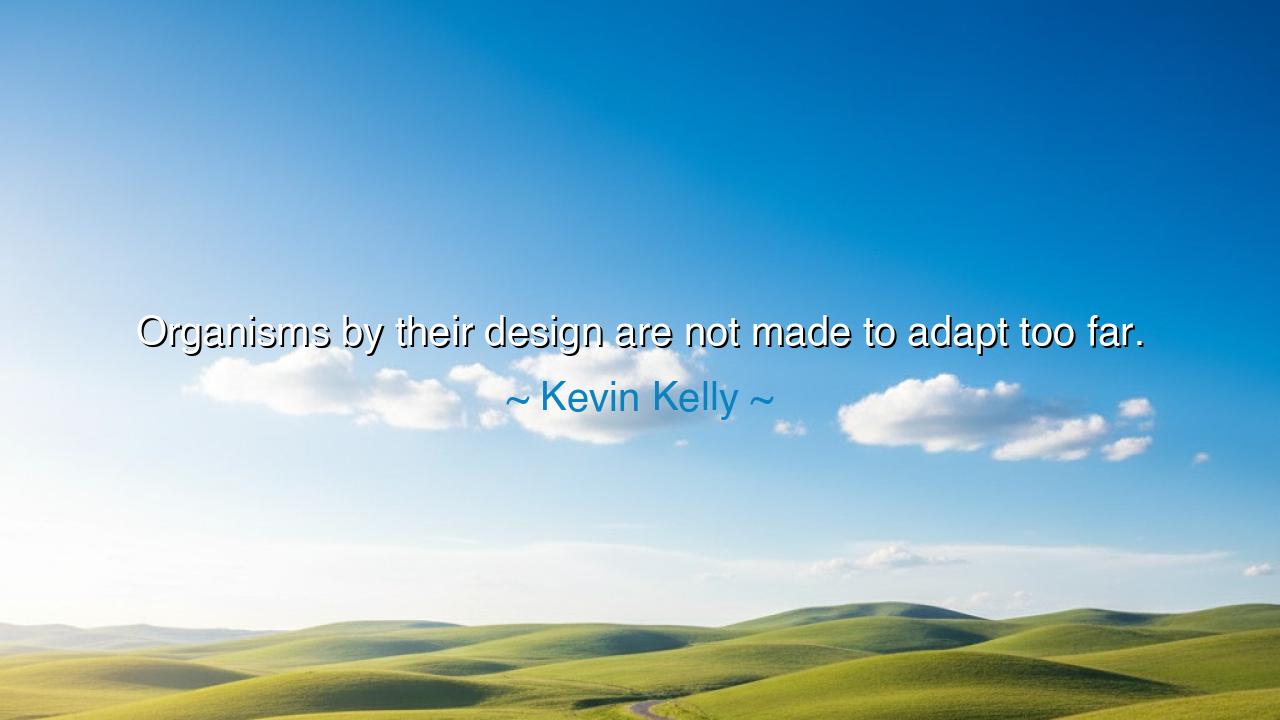
Organisms by their design are not made to adapt too far.






In the quiet voice of a modern philosopher, Kevin Kelly, the visionary thinker of technology and evolution, once declared: “Organisms by their design are not made to adapt too far.” These words, though brief, carry the solemn weight of natural law — the truth that all living things, even in their brilliance and resilience, are bound by limits. Kelly, who saw parallels between biological and technological evolution, reminds us that the power to adapt, though wondrous, is not infinite. Life, by its very structure, can only bend so far before it breaks. To understand this is to grasp both the fragility and the grandeur of existence.
In this truth lies the paradox of creation: every design is both gift and restraint. The bird, crafted for flight, cannot live beneath the sea; the fish, shaped by the water, cannot breathe the open air. Each organism, each system, is a miracle of adaptation within its domain, yet the same traits that make it thrive also tether it to its bounds. Thus, when Kelly speaks of limits, he is not condemning life’s design — he is honoring its precision. The universe does not craft endlessly mutable beings, but balanced ones, built to endure within a narrow harmony. When the world changes beyond that harmony, extinction comes not from weakness, but from the immutable truth that no form can outgrow its own nature.
The origin of this thought can be traced to Kelly’s lifelong study of evolution and technology — his belief that life and innovation follow parallel patterns. He observed that whether in nature or in invention, each form carries the logic of its origin, and that same logic defines its future. Just as the horse cannot become a whale, a civilization cannot easily abandon the principles upon which it was built. This understanding connects the biological with the cultural: our societies, our beliefs, even our technologies are organisms of design. They too evolve — but only within the boundaries of their structure, their assumptions, their histories. When they attempt to leap too far beyond their design, they falter.
This lesson is seen throughout history. The mighty Roman Empire, for example, expanded beyond the limits of its structure — its governance, its communication, its moral core. What began as a disciplined republic became a vast machine too sprawling to sustain itself. Its design, once perfect for a city-state, could not adapt to a world empire. The same laws that once strengthened it later suffocated it. So it is with organisms, so it is with nations, and so it is with men: what empowers us within one age may bind us in the next. To adapt too far is to lose the integrity of one’s form; to resist adaptation entirely is to invite extinction. Wisdom lies between these two extremes.
In nature, the dodo bird stands as a haunting emblem of this truth. For centuries it lived untouched upon its island, perfectly adapted to a world without predators. When man arrived, its innocence — once its strength — became its downfall. It could not flee, it could not fight, it could not change fast enough. Its very design sealed its fate. Yet from this tragedy emerges understanding: adaptation is not a matter of will, but of capacity. The dodo was not foolish; it was faithful to its nature. And in its extinction, it teaches the living that even the most peaceful design must be tested by time.
But Kelly’s insight also offers hope. For though organisms cannot adapt too far, they can cooperate, evolve, and create new designs. In this, humanity holds a unique power. Unlike the beasts of instinct, we can reflect upon our constraints and consciously reshape them. Our challenge, however, is to do so wisely — to honor the limits of nature even as we push them. The mind that forgets its roots, that believes it can transcend all boundaries, falls into hubris. The mind that fears change, that clings to old forms, withers into irrelevance. The path of endurance lies in understanding the rhythm between design and transformation.
So, O seeker of truth, take heed of Kelly’s teaching: to know one’s limits is not weakness, but strength. The wise man studies his own design — his habits, his culture, his faith — and learns which parts must remain and which may evolve. When the storms of change arrive, bend where you can, but do not break your essence. Remember that growth without grounding leads to collapse, and that survival without adaptation leads to decay.
Thus, let this truth guide your days: every organism, every nation, every soul is shaped by a divine architecture. Do not curse your limits — understand them. Do not stretch your nature until it fractures, but refine it until it shines. The oak does not envy the reed, nor the eagle the whale; each endures by being what it was meant to be. And so must you. For though organisms by their design are not made to adapt too far, within those sacred bounds lies the infinite potential of life — the power to thrive, to change in measure, and to endure through every age.






AAdministratorAdministrator
Welcome, honored guests. Please leave a comment, we will respond soon